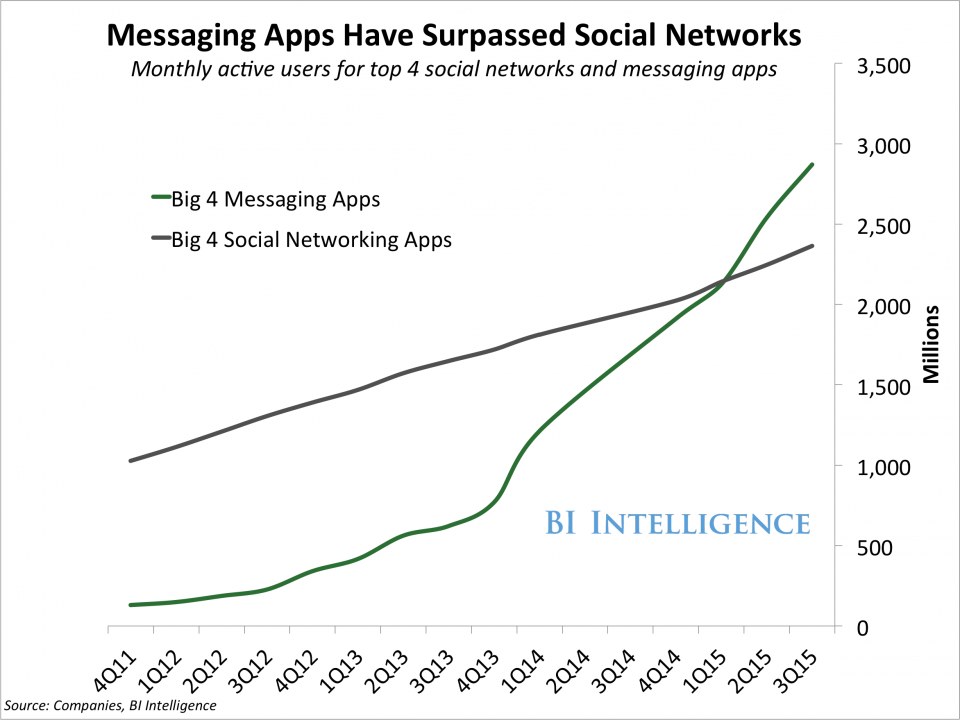Who would be happier than Mark Zuckerberg as his dream of connecting the world is slowly becoming a reality. WhatsApp, which was acquired by Facebook, has touched the 1 billion active user mark early this year. And now it is Facebook Messenger. Facebook has revealed that the Messenger achieved the much-awaited milestone of 1 billion monthly active users (MAUs) on Wednesday. As a social networking platform, Facebook boasts a sizeable 1.65 billion monthly active users. While its mobile photo sharing platform Instagram also peaked at 500 million MAUs last month.
Facebook Messenger is a refurbished version of Beluga, developed by ex-Googlers, but visualizing its potential Facebook bought the startup in 2011. Though the forced installation of Messenger App along with its Facebook App didn’t go quite well with some of its users, for Facebook, it paid off. Within the last 20 months, Messenger’s active user base doubled, and it took five years for Messenger to reach 1 billion MAUs mark.
Here are few more interesting facts about Facebook’s messaging service:
- Each month a strong 1 billion messages are being exchanged.
- A considerable 17 billion photos are being shared through Messenger every month.
- People exchange around 22 million GIF’s, 380 million stickers every day.
- A whopping 10% of all VoIP calls are made via Messenger App.
- To make the services more lucrative a sizeable 18,000 bots and 23,000 developers would work on Facebook’s Wit.ai Bot Engine.
The future of the messaging industry
Messaging apps are no more limited to casual chatting. Chinese Messaging Apps, i.e. WeChat, LINE, and KakaoTalk have come up with innovative ideas like booking a cab or shopping through the apps. Considering the enormous market potential, a mobile messaging app posses Google is also working on a new Messaging app called Google Allo. Google has implemented similar features akin to the Chinese messaging apps in Google Allo.
For the last two years, the focus of internet users has been shifting from the active usage of social media apps to Messaging apps. The number of total users of top 4 messaging apps combined has surpassed the number of total users on social network platforms, according to BI Intelligence. The very objectives of the messaging apps were to concentrate on growth, and after attaining a sizeable chunk of the market now, the firms are likely to shift their focus on monetarizing their growth by incorporating a number of services.
The growing penetration of smartphone and mobile internet will also help the mobile messaging industry to record an unprecedented growth in the coming years. Around 3.4 billion users will be using the Internet by the end of 2016. Of them, more than 2 billion will access through their mobile devices. On the other hand, the exploded adoption of smartphones will continue to be robust, as almost 2.87 billion people will own the smartphone by the end of 2020. Factoring such enormous growth in mobile space, mobile messaging apps industry has enough of room to grow further.
Facebook is Strengthening Its Mobile Messaging Ecosystem
Facebook has dominated the mobile messaging market and has overshadowed, rather killed, its main rival, SMS. Zuckerberg himself revealed the domination of his messaging apps in the digital world. A whopping 60 billion messages are being exchanged on WhatsApp, whereas, on Facebook Messenger, just 20 billion SMSs are being sent on a daily basis.
The potential of mobile messaging apps, especially WhatsApp, can be judged by the growth number. A massive 100 million conversations are made via WhatsApp in a single day i.e. 1,100 calls in a second. Thus, these messaging apps have just started eating, albeit very slowly for now, into the call revenues of telecom operators after killing their SMS arm. However, with the growing penetration of 4G LTE network, and dropping prices of LTE tariffs, people may start relying on app calls than traditional phone calls. Mobile phone users will be glued with messaging apps offerings end to end telecom services, from messaging to calls to voice chat, like never before.
Attaining the 1 billion user base has practically made WhatsApp and Facebook Messenger App resilient to the market. Its main competitor, WeChat with 792 million active users, is mostly confined to China, which makes Facebook fearless for the growth of its babies on the global level.
How the Two platforms of Facebook are different
Apparently, the main idea of Facebook is to make WhatsApp available for messaging and other personal activities, whereas Messanger will be focused on providing business services, likes of chat integration with business websites, sending money to individuals, etc.
Secondly, While signing up for WhatsApp one has to provide one’s phone number, but it’s not the case with the Messenger app. Thus, the messenger app may be considered as a more seamless App. WhatsApp doesn’t feature Video calls, but it’s not the case with Facebook Messenger.


